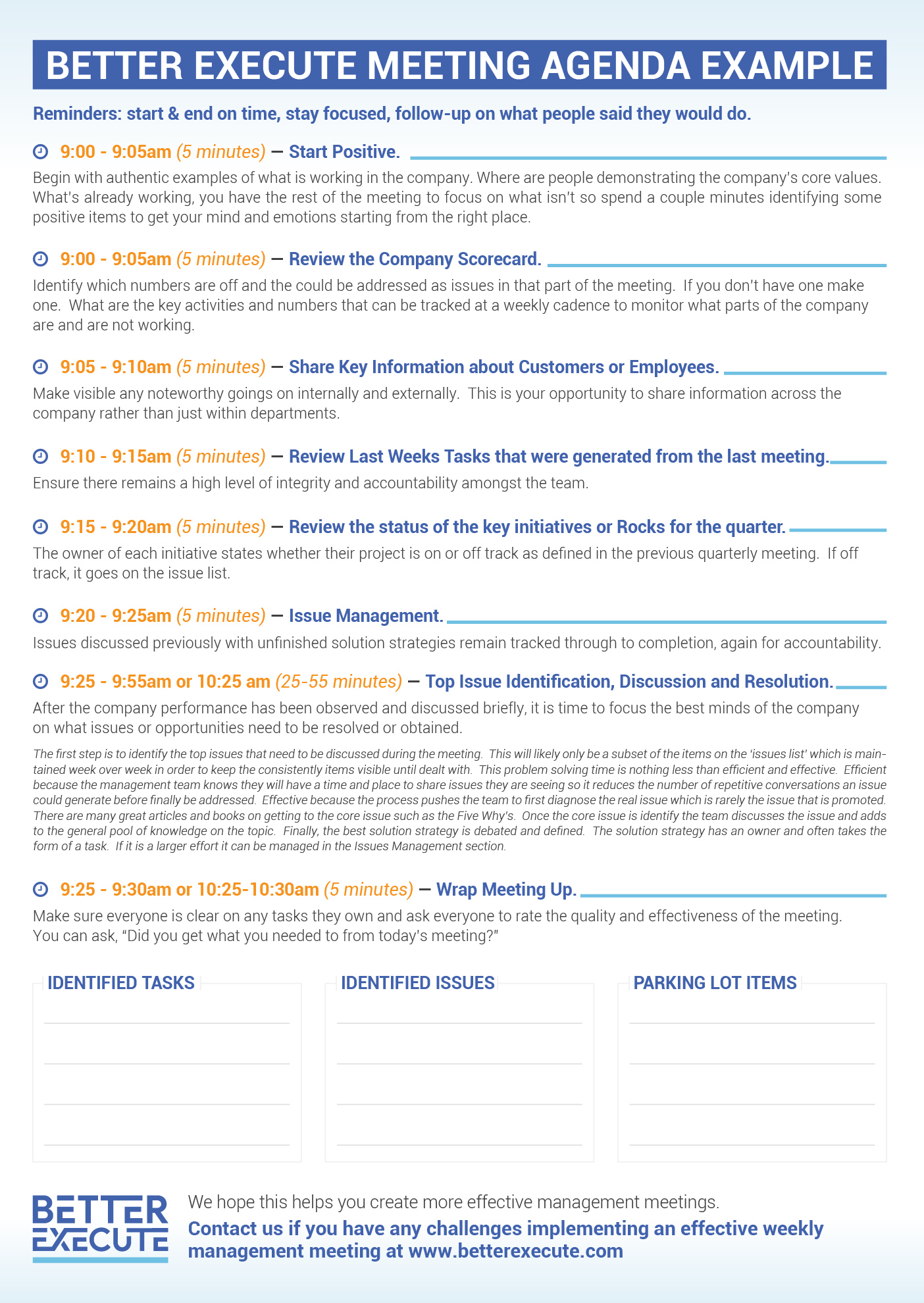- [email protected]
- 7402 Center Ave. Huntington Beach, CA 92647
Management Meetings, like many of the fundamental business strategies, are often regarded as not particularly valuable. This article focuses on the strategies required to make Effective Management Meetings the linchpin of your business.
As a quick reminder, there are five core disciplines business leaders should ensure are well implemented and maintained for a strong and adaptable business.
#1 – Practical Company Planning
#2 – Using an Accountability Chart
#3 – Effective Management Meetings
#4 – Monitoring a Simple Company Scorecard
#5 – Strong Financial Control
This article focuses on #3 in the series: The Discipline of Effective Management Meetings. You can find previous articles at betterexecute.com, with subsequent articles published over the coming weeks.
Although there are many reasons why Effective Management Meetings are necessary, three important reasons are to improve Accountability, Focus and Problem Solving. Here is how:
Accountability:
Your team needs to develop and maintain a high level of integrity in achieving its objectives. Too often, companies have meetings where they identify important tasks that need to be completed by specific individuals. Yet without consistent accountability, these tasks lack the discipline to achieve a timely and effective outcome. Instilling this mentality regularly will develop a continued culture of strong and appreciated accountability.
A well-run Management Meeting will identify key tasks or project benchmarks that need to be completed by the following meeting and managed in the interim. This process will identify weak performers as well as validate those who are striving to complete their tasks on schedule.
Focus:
As the renowned management consultant Peter Drucker states: “What gets measured gets managed”. Another key part of an effective management meeting is reviewing a Company Scorecard.
Your Company Scorecard tracks five to seven key performance indicators (KPIs) week on week, as well as some core financial numbers such as sales revenues, to monitor how the company is performing. This keeps everyone aware of the status of the company, identifying concerns early to prevent them from becoming major issues that affect cashflow and financial results. We all have the same amount of time in a week. Focusing on the right issues to work on is the difference between a productive company and one that is just busy.
Problem-Solving:
When considering the value of solving problems before they develop into bigger problems, it is often said that you should, “kill the giant when it is a baby”.
This sage advice is regularly overlooked without effective weekly Management Meetings. Any good management meeting will have the majority of its duration dedicated to clarifying and resolving key issues. This requires both skill and discipline. Skill is needed in order to correctly tease out the core issues at play, while discipline is required to identify practical strategies that are implemented and managed until the issues are completely resolved. Often management teams will address the symptoms rather than tackling the root cause of an issue. This allows problems to compound over time, impacting morale and productivity.
Our favourite agenda for high-quality weekly 60-90-minute management meetings is outlined below. Click here to download our free agenda format to use as a starting point in creating an agenda that meets your company needs:
Be sure to start and end on time – or earlier when possible. Use your meeting’s minutes to capture a list of items or topics that were not able to be discussed so they can be reviewed at the next week’s meeting.

Although there can be many reasons why a meeting is not seen as effective, the most common reasons are:
All of these issues are valid reasons for why people may not place a great deal of value on weekly management meetings.
Effective Weekly Management Meetings are the most important discipline to get right with your team. You will keep everyone focused and inspired to do great work and identify problems in the company’s performance when the challenges are small and manageable. We hope this article has inspired you to tighten up your weekly management meeting in places you hadn’t been thinking about improving. Enjoy the process!

Learn how to double your client referrals in just 30 days using a proven Customer Management Framework, For FREE.
The Game Changing FREE Framework Every B2B Business Needs.
We promise to keep your data safe as stated in our privacy policy.